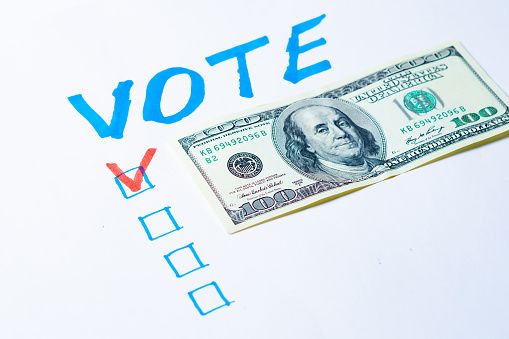Vote Buying and Its Economic Costs

Vote buying is a method by which politicians promise to give something to voters in exchange for their vote. This practice is often referred to as patronage politics. In Nigeria, it was common during the 2007 presidential elections. A campaign can promise to give a candidate a specific thing in return for his or her vote, such as a food gift or clothing.
The practice is particularly prevalent in single-mandate districts. Candidates who win in such districts tend to become politically and economically ensconced in their district. As a result, they are more likely to make their votes count. It also leads to a dependency on vote buying. This exercise is carried out with enough provision of voting booth posts.
Vote buying is a form of machine politics. It requires significant cash disbursements in advance of an election. These disbursements are usually financed through illiquid assets such as money in the shadow economy that can be converted into cash. These funds may then end up in bank deposits.
Vote buying is illegal in some countries. However, it remains an issue during elections. Many observers have noted it. Several studies have been conducted on the topic, and these have provided insight into the mechanisms and the economic costs of both systems.
In Nigeria, a study found that 12% of respondents said they had received something in return for their vote. The going price for a vote in that country was 500 naira in 2003, and the cost of a vote during the presidential election in 2007 was $4.
One of the leading firms that sells voting machines and technology is ES&S. In 2007, the firm controlled nearly 70 percent of the election supplies market. ES&S had to acquire about half a dozen smaller companies before acquiring Global Elections Systems.
ES&S also has a large sales force. According to ES&S, the company does not disclose financial information, but it did provide written responses to questions about the company's role in the election scandals. Despite its size, the company does not provide information on its sales staff or product development workforce.
ES&S has tried to repackage its products. For instance, the company purchased voting machines from Global Elections Systems and renamed them as ES&S. But it had to purchase other supplies, such as printers, and it had to sign a long-term contract with customers.
ES&S has been involved in a number of lawsuits. The company has threatened to sue cybersecurity experts and customers who have attended security conferences where ES&S products have been discussed. They have also attempted to shut down a group that posts manuals online.
ES&S says that the company is working on a new, faster process for certifying and servicing its machines. At the same time, the company has hired former election officials as lobbyists in statehouses. ES&S has also offered to donate money to political campaigns and candidates.
ES&S argues that its voting machines are not responsible for election controversies. ES&S's spokesperson declined an interview. However, the company has also filed many lawsuits, including one in Wisconsin over the 2016 national elections. If you probably want to get more enlightened on this topic, then click on this related post: https://en.wikipedia.org/wiki/Election.